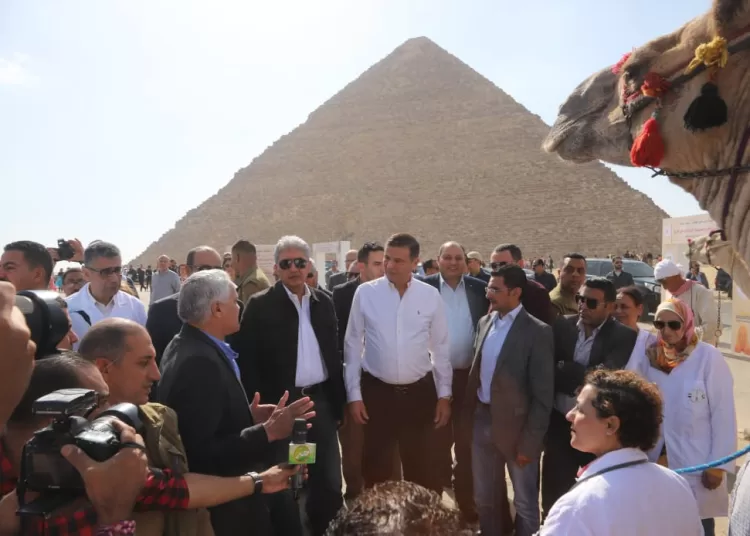In the shadow of the majestic Great Pyramid of Khufu, a significant initiative aimed at safeguarding the well-being of creatures historically intertwined with Egypt’s cultural heritage was recently unveiled on a sunlit day.
With the pyramids standing as timeless witnesses to this pivotal development, Minister of Tourism and Antiquities, Sherif Fathy, alongside Minister of Agriculture and Land Reclamation, Alaa Farouk, launched the National Programme for the Care and Protection of Horses, Camels, and Pets at Archaeological Areas.
The programme, forged in collaboration with civil society organisations dedicated to animal welfare, marks a significant stride in aligning Egypt’s ancient treasures with contemporary humane practices.
The ministers, flanked by officials and animal welfare experts, roamed the periphery of the pyramids, where veterinary convoys diligently vaccinated camels and horses.
This proactive effort extends to mobile clinics from the General Authority for Veterinary Services, supported by the Agricultural Bank of Egypt, the Animal Reproductive Research Institute, and veterinary colleges across Egyptian universities.
The scene portrayed a vivid picture of care, echoing Egypt’s commitment to preserving both its cultural legacy and the animals that contribute to its historical tourism industry.
Minister Fathy, speaking with a fervour reflective of the significance of the location, underscored the launch as the inaugural chapter in a broader national programme.
This initiative, he said, will systematically affect archaeological sites throughout Egypt, prioritising them based on urgency and scope of the area.
The formation of veterinary convoys, coupled with mobile clinics, aims to monitor and care for animals diligently, ensuring their health aligns with the standards expected of sites so steeped in historical importance, he added.
A particularly notable feature of the programme is the establishment of a dedicated veterinary unit in the Riding Zone, part of the ongoing development at the vicinity of the Giza Pyramids Plateau.
This constitutes a cornerstone in ensuring continuous health checks and immunisations for camels and horses, enabling a perpetual cycle of care.
Further enhancing this endeavour is a proposed integrated training centre, designed to educate and guide camel and horse owners on humane treatment practices.
“It’s a holistic approach that doesn’t not only address immediate health concerns, but also focuses on long-term welfare through education and awareness,” Fathy said.
Meanwhile, Minister Farouk highlighted the initiative’s commitment to delivering comprehensive veterinary services free of charge. This measure extends across all archaeological sites in Egypt, such as Saqqara, Nazlet El-Simman, Luxor and Aswan, reaching even into the heart of rural Egyptian communities.
“An ambitious plan enlivened by the presidential initiative, Bedaya, saw the deployment of 850 veterinary convoys that have served over a million head of cattle, embodying the essence of care and support for Egypt’s animal partners,” Farouk said.
The event featured a dialogue between the ministers and local camel and horse owners.
The discussions emphasised the importance of humane treatment towards these animals, recognising them as sentient beings deserving of compassion and care.
Acknowledging the role these animals play in sustaining livelihoods and enhancing the tourism experience for visitors, both domestic and international, the two ministers urged respectful and considerate interactions.
As plans move forward, with routine meetings and awareness seminars paving the way, the response from the animal owners was one of gratitude.
For their part, they expressed appreciation for the ministers’ dedication to both their welfare and the tourism sector’s growth.






Discussion about this post